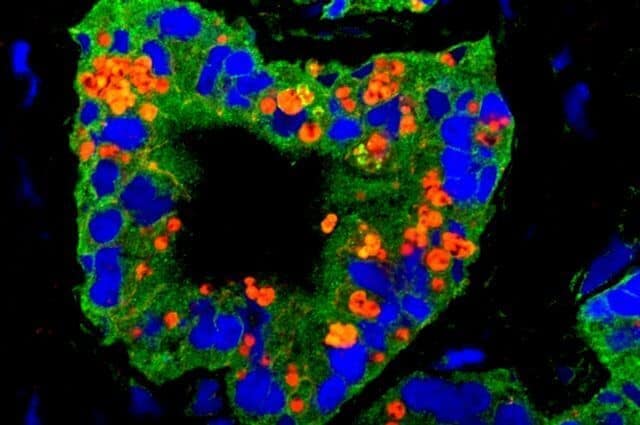Scientists at the UCLA Eli and Edythe Broad Center of Regenerative Medicine and Stem Cell Research have shown that the cells responsible for generating deadly prostate cancer share some genetic qualities with the tissue-specific stem cells that naturally reside in the healthy prostate.
The findings were published today in the journal Proceedings of the National Academy of Sciences.
“Pinpointing the cellular traits of cancer — what makes those cells grow and spread — is crucial because then we can possibly target those traits to reverse or stop cancer’s progression,” said Owen Witte, founding director of the UCLA Broad Stem Cell Research Center and the study’s lead author. “Our findings will inform our work as we strive to find treatments for aggressive prostate cancer.”
Witte is a Howard Hughes Medical Institute investigator and a member of President Obama’s Cancer Panel, which monitors the development and execution of the National Cancer Program.
Witte and the study’s first author, Bryan Smith, worked with collaborators from UC Santa Cruz to investigate the genetic characteristics of aggressive prostate cancer, which spreads, or metastasizes, to other organs in the body.
Collaborators from UC Santa Cruz include Joshua Stuart, the Jack Baskin Endowed Chair of Engineering, and Artem Sokolov, a postdoctoral fellow in Stuart’s lab.
The research team analyzed biopsies from living patients with metastasized prostate cancer who are participating in clinical trials for the Stand Up To Cancer initiative.
Biopsy analysis provided the team with a 91-gene “signature” for the stem cells that naturally reside in prostate tissue. Comparing this signature to genetic data from patients with aggressive prostate cancer, the researchers found that normal prostate tissue stem cells and aggressive prostate cancer cells possess similar characteristics.
“Evidence from cancer research suggests that aggressive cancers have stem–cell-like traits,” said Smith, a postdoctoral researcher in Witte’s lab. “We now know this to be true for the most aggressive form of prostate cancer.”
Prostate cancer is the second leading cause of cancer death in American men, after lung cancer. Standard treatments include surgery, radiotherapy and hormone suppression therapy. The disease is often treatable, but the chance of survival drops drastically if the tumor becomes resistant to traditional therapies and metastasizes. When this occurs, few treatment options remain for prostate cancer patients.
“Treatments for early stage prostate cancer are often successful, but therapies that target the more aggressive and late-stage forms of the disease are urgently needed,” said Witte. “I believe this research gives us important insight into the cellular nature of aggressive prostate cancer.” Witte is also a UCLA Jonsson Comprehensive Cancer Center member and a professor of microbiology, immunology and molecular genetics in the UCLA David Geffen School of Medicine.
The research was supported by a Stand Up to Cancer — Prostate Cancer Foundation — Prostate Dream Team Translational Cancer Research grant, which is made possible by the support of the Movember Foundation. The Stand Up to Cancer initiative is a program of the Entertainment Industry Foundation administered by the American Association for Cancer Research. Bringing together top scientists from across North America, the initiative is a multi-institutional effort to share research with a focus on developing treatments that benefit patients. Witte is the co-leader of a Stand Up to Cancer Prostate Cancer Dream Team with principal investigator Eric Small of UC San Francisco.
The research was also supported by the UCLA Tumor Immunology Training Program, the National Institutes of Health and the UCLA Broad Stem Cell Research Center.

